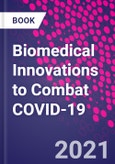Biomedical Innovations to Combat COVID-19 provides an updated overview on the development of vaccines, antiviral drugs and nanomaterials, and diagnostic methods for the fight against COVID-19. Perspectives on such technologies are identified, discussed, and enriched with figures for easy understanding and applicability. Furthermore, it contains basic aspects of virology, immunology, and antiviral drugs that are needed to fully appreciate these innovations.
This book is split into four sections: introduction, presenting basic virologic and epidemiological aspects of COVID-19; vaccines against COVID-19, discussing their different types and applications used to develop them; diagnostic approaches for SARS-CoV-2, encompassing advanced sensing and microfluidic-based biosensors; and drug development and delivery, where antivirals based on nanomaterials or drugs are presented.
It is a valuable source for virologists, biotechnologists, and members of biomedical field interested in learning more about how novel technologies can be applied to fasten the eradication of the COVID-19 and similar pandemics.
Please Note: This is an On Demand product, delivery may take up to 11 working days after payment has been received.
Table of Contents
1. Basic virological aspects of SARS-CoV-22. Fundamental aspects of the structural biology of Coronaviruses3. Introduction to the SARS-CoV-2/COVID-19 epidemiology4. Structural biology of the SARS-Cov 2 replisome: evolutionary and therapeutic implications5. Clinical progression of patients with COVID-19: The impact of the pandemic in Latin America6. Overview of the immune response against SARS-CoV-27. Viral-vectored vaccines against SARS-CoV-28. RNA-based vaccines against SARS-CoV-29. Particulate vaccines against SARS-CoV-210. VLPs-based vaccines against SARS-CoV-211. Innovative recombinant protein-based vaccines against SARS-CoV-212. SARS-CoV-2 Vaccines: Current Trends and Prospects of Developing Plant-Derived Vaccines13. Nanobodiestargeting SARS-CoV-214. 2D materials and van der Waals heterostructures platforms for advanced sensing of COVID-1915. Microfluidic-based biosensor for SARS-CoV-2 antibodies16. Antivirals based on nanomaterials against SARS-CoV-217. The potential of drug delivery nanosystems to treat COVID-1918. The role of traditional medicine in the fight against SARS-CoV-2








